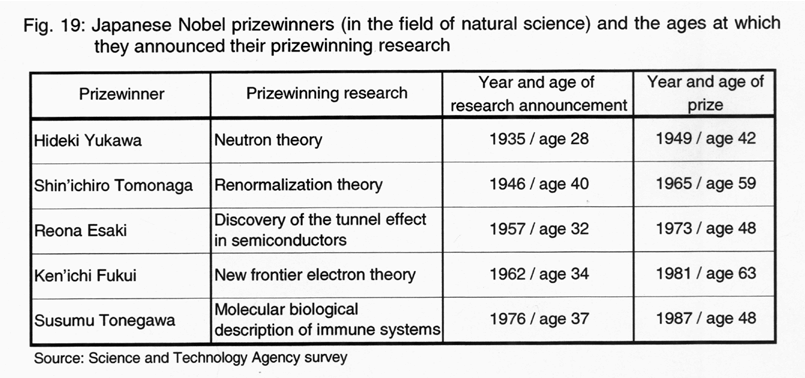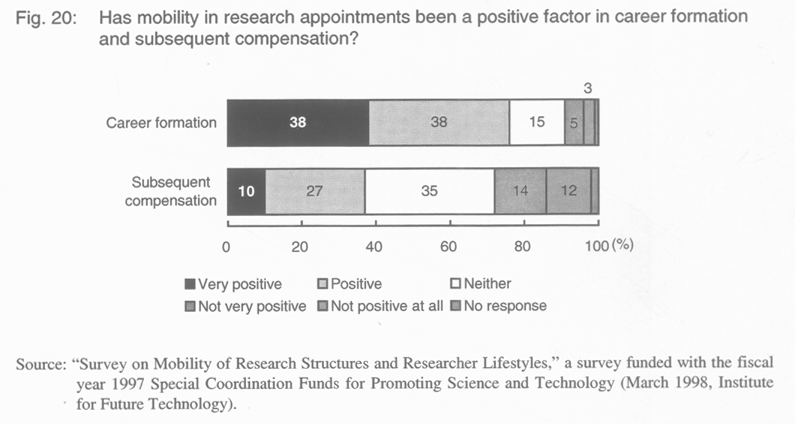| Home > Policy > White Paper, Notice, Announcement > White Paper > Annual Report on the Promotion of Science and Technology 1999 > Part1 Chapter3 Section2 1 | ||
| (Environments where Researchers can Demonstrate Their Abilities) |
![]() Researchers normally produce high-level results when they
are in their prime, i.e., between their late 20s, after completing a doctoral
program, and through their late 30s. All of Japan's five Nobel prizewinners in
natural science achieved their prizewinning results in that period, i.e., either
in their late 20s or in their late 30s ( Fig.
19 ). In other words, whether a researcher achieves high-level results depends
on the type of research environment in which he or she works during this period.
Researchers normally produce high-level results when they
are in their prime, i.e., between their late 20s, after completing a doctoral
program, and through their late 30s. All of Japan's five Nobel prizewinners in
natural science achieved their prizewinning results in that period, i.e., either
in their late 20s or in their late 30s ( Fig.
19 ). In other words, whether a researcher achieves high-level results depends
on the type of research environment in which he or she works during this period.

![]() In order for their abilities to develop, young researchers
require research systems and environments that allow them to act on their own
discretion and to select workplaces where they can find good mentors and display
their own capabilities. When asked why they wished to move to another research
institute, 70% of researchers cited the desire for interchange with new researchers,
suggesting that researchers themselves also desire stimulating environments.
In order for their abilities to develop, young researchers
require research systems and environments that allow them to act on their own
discretion and to select workplaces where they can find good mentors and display
their own capabilities. When asked why they wished to move to another research
institute, 70% of researchers cited the desire for interchange with new researchers,
suggesting that researchers themselves also desire stimulating environments.
| (Promoting Researcher Mobility) |
![]() In addition to the types of environments that permit research
by own initiative, enhancing researcher creativity through intellectual stimulation
also requires greater human resource mobility, including compensation and social
security systems. Measures such as annual, performance-based salaries would encourage
active mobility among researchers. It is also important to adequately ameliorate
the considerable disadvantages in social security and pensions currently faced
by postdoc researchers and other researchers with job mobility.
In addition to the types of environments that permit research
by own initiative, enhancing researcher creativity through intellectual stimulation
also requires greater human resource mobility, including compensation and social
security systems. Measures such as annual, performance-based salaries would encourage
active mobility among researchers. It is also important to adequately ameliorate
the considerable disadvantages in social security and pensions currently faced
by postdoc researchers and other researchers with job mobility.
| (Enhancing Research Support Functions) |
![]() Securing the required numbers of research assistants requires
the use of placement agencies with research support services. The advanced, complicated
nature of a research assistant's duties necessitates consideration of the collection
and providing of personnel information and the use of retired researchers, for
instance. Placement agencies and research centers where research assistants are
employed must actively promote measures to improve the abilities of research
assistants. Funding and other measures must be considered to encourage cooperation
among government, industry and academia in this regard.
Securing the required numbers of research assistants requires
the use of placement agencies with research support services. The advanced, complicated
nature of a research assistant's duties necessitates consideration of the collection
and providing of personnel information and the use of retired researchers, for
instance. Placement agencies and research centers where research assistants are
employed must actively promote measures to improve the abilities of research
assistants. Funding and other measures must be considered to encourage cooperation
among government, industry and academia in this regard.
![]() In addition, research assistants who undergo training or education
or who receive certification should see those efforts reflected in their compensation.
In addition, research assistants who undergo training or education
or who receive certification should see those efforts reflected in their compensation.
| (The Effective Utilization of Postdoc Researchers) |
![]() Many young researchers hone their research abilities through
postdoc research or research experience that involves job mobility. Many, however,
do not feel that such experience necessarily translates into better compensation
( Fig. 20 ), while many
companies show little desire to employ postdoc researchers. Nonetheless, the
effective utilization of such researchers would raise the overall level of Japan's
research abilities.
Many young researchers hone their research abilities through
postdoc research or research experience that involves job mobility. Many, however,
do not feel that such experience necessarily translates into better compensation
( Fig. 20 ), while many
companies show little desire to employ postdoc researchers. Nonetheless, the
effective utilization of such researchers would raise the overall level of Japan's
research abilities.

![]() Better understanding of the activities of postdoc and other
researchers require not just efforts on the part of researchers themselves, but
also efforts to raise society's awareness by, for instance, creating a centralized
system for databasing the achievements of such researchers and disseminating
information.
Better understanding of the activities of postdoc and other
researchers require not just efforts on the part of researchers themselves, but
also efforts to raise society's awareness by, for instance, creating a centralized
system for databasing the achievements of such researchers and disseminating
information.
| (The Effective Utilization of Foreign Researchers) |
![]() The globalization of research and development makes foreign
researchers an option in R&D personnel. After considering such factors as
what form of pension foreign researchers would receive, Japan must create an
environment that makes it easier for foreign researchers to work in Japan. When
the type of excellent foreign researchers who would be revered by young Japanese
and foreign researchers are employed as research leaders, Japan's R&D abilities
will rise and the R&D environment will become more intellectually stimulating
to Japanese researchers.
The globalization of research and development makes foreign
researchers an option in R&D personnel. After considering such factors as
what form of pension foreign researchers would receive, Japan must create an
environment that makes it easier for foreign researchers to work in Japan. When
the type of excellent foreign researchers who would be revered by young Japanese
and foreign researchers are employed as research leaders, Japan's R&D abilities
will rise and the R&D environment will become more intellectually stimulating
to Japanese researchers.
![]() As R&D periods are shortened and more and more existing
technologies become obsolete, the distance between R&D achievements and marketable
products is shorter than ever before. Researchers at universities and national
research institutes respond passively regarding the reflection of patents, etc.,
into research evaluation, indicating the need for measures to incorporate patents
into research evaluation in order to motivate researchers to patent the results
of their research.
As R&D periods are shortened and more and more existing
technologies become obsolete, the distance between R&D achievements and marketable
products is shorter than ever before. Researchers at universities and national
research institutes respond passively regarding the reflection of patents, etc.,
into research evaluation, indicating the need for measures to incorporate patents
into research evaluation in order to motivate researchers to patent the results
of their research.
![]() The most effective form by which knowledge can be transferred
is for the researcher who made the invention or discovery to participate in the
process of using that invention or discovery to benefit society or the economy.
Thus, further encouragement and support for researchers wishing to become entrepreneurs
or otherwise participate in private-sector activity would heighten researchers'
awareness of intellectual assets and prompt researchers to think about what it
is society expects of them. To this end, Japan must pursue incentives for such
researchers, along with various other efforts, and improve and expand various
research support functions, such as assistance with patent applications and other
difficult procedures and formalities.
The most effective form by which knowledge can be transferred
is for the researcher who made the invention or discovery to participate in the
process of using that invention or discovery to benefit society or the economy.
Thus, further encouragement and support for researchers wishing to become entrepreneurs
or otherwise participate in private-sector activity would heighten researchers'
awareness of intellectual assets and prompt researchers to think about what it
is society expects of them. To this end, Japan must pursue incentives for such
researchers, along with various other efforts, and improve and expand various
research support functions, such as assistance with patent applications and other
difficult procedures and formalities.
| Back to Top | MEXT HOME |